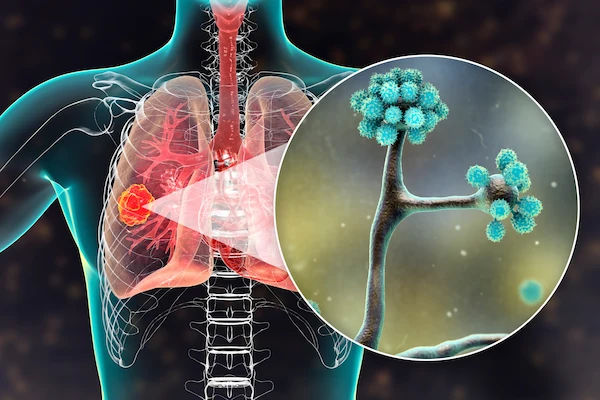How To Reduce Lymphocytes?
Learn about the causes of high lymphocyte levels, medical implications, treatments, and prevention tips. Discover how to monitor lymphocyte counts and when to seek medical attention to maintain a healthy immune system.

Written by
Last updated on 3rd Jul, 2025
Lymphocytes are a type of white blood cell (WBCs) essential for your immune system, which defends your body against infections and diseases. They are primarily divided into two types: T lymphocytes (T cells) and B lymphocytes (B cells). T cells help regulate the immune response and directly target and destroy infected or tumor cells, while B cells produce antibodies—proteins that identify and neutralise harmful invaders like viruses and bacteria. A temporary increase in lymphocyte count is common after an infection, but a significant rise may signal an underlying issue. Continue reading to explore the potential causes of a high lymphocyte count and ways to manage it.
Causes of Elevated Lymphocyte Levels
An increased lymphocyte count often signals that the body is responding to an infection or inflammation. These white blood cells play a crucial role in defending against harmful invaders. However, in some cases, persistently high lymphocyte levels may indicate an underlying serious condition, such as blood or lymphatic cancers. Some of the common causes of a high lymphocyte count include:
1. Infections
Many viral infections lead to lymphocytosis, though bacterial and parasitic infections can also contribute. Some common infections linked to elevated lymphocyte levels include:
Cytomegalovirus (CMV)
Epstein-Barr virus (mononucleosis)
Influenza (flu)
Adenovirus
Whooping cough
Hepatitis
Mumps
Chickenpox or shingles
HIV
Rubella
2. Cancer
Certain blood and lymphatic cancers may be associated with high lymphocyte levels. These include:
Non-Hodgkin lymphoma
Chronic lymphocytic leukemia
Large granular lymphocytic leukemia
Acute lymphoblastic leukemia
3. Other Contributing Factors
Smoking
Physical or emotional stress due to medical emergencies
Allergic reactions to medication
Removal of the spleen (asplenia)
Autoimmune disorders
Medical Implications of High Lymphocyte Counts
Although an elevated lymphocyte count itself may not be harmful, the underlying cause can lead to serious health issues if not properly managed. The severity of complications depends on the condition responsible for the increase and how promptly it is treated.
Infections: If a bacterial infection is not treated in time, it may escalate to sepsis—a life-threatening condition where the body’s extreme response to infection triggers inflammation, potentially leading to organ failure.
Chronic Lymphocytic Leukemia (CLL): Persistent lymphocytosis due to CLL can weaken the immune system, increasing vulnerability to infections. It may also result in anemia, causing fatigue and difficulty breathing. In some instances, CLL can advance into a more aggressive version of leukemia.
Autoimmune Disorders: Conditions like rheumatoid arthritis and lupus, which can contribute to high lymphocyte levels, may cause severe complications such as joint deterioration or organ damage over time.
Leukostasis (Rare Cases): Extremely elevated lymphocyte counts can sometimes lead to leukostasis, a condition where white blood cells cluster together and obstruct small blood vessels. This can restrict blood flow to critical organs, potentially resulting in serious damage or organ failure.
Diagnostic Approach
Lymphocyte levels can vary based on factors such as age, sex, race, altitude, and lifestyle. The normal range for lymphocytes in adults is 1,000-4,800 lymphocytes per microlitre of blood. The normal range in children is 3,000-9,500 lymphocytes per microlitre of blood. To measure lymphocyte levels, healthcare providers use several blood tests, including:
Absolute Lymphocytes Count: This test is part of a complete blood count (CBC) and provides the actual number of lymphocytes in the blood, rather than a percentage. It’s calculated by multiplying the total number of WBCs by the percentage of WBCs that are lymphocytes.
Flow Cytometry: This test processes your blood in a specialised laboratory, where a technician uses a flow cytometer. The blood is suspended in a fluid and passed through a laser that scatters the light in patterns, making it easier to identify and count different types of cells.
Medical Treatments for Elevated Lymphocyte Levels
Managing lymphocytosis involves treating the underlying condition that has caused the increased lymphocyte count. If the rise in white blood cells is due to an infection, treatment may not be necessary, as the immune system typically resolves it on its own. However, if the elevated levels indicate a more serious condition, such as cancer, consulting a healthcare provider for appropriate treatment options is essential. By treating the root cause, lymphocyte levels can often return to a normal range, supporting overall health and immune function. The treatment options include:
Supportive care for viral infections
Antibiotics for bacterial infections
Targeted therapy utilises drugs that focus on specific abnormalities in cancer cells.
Immunotherapy harnesses the immune system to combat cancer cells.
Chemotherapy utilises medicines to destroy fast-growing cells.
Medications like disease-modifying antirheumatic drugs (DMARDs), corticosteroids, or biologic therapies are used to treat autoimmune diseases.
When to Seek Medical Attention?
Consult a doctor if you experience any of the following:
Persistent symptoms or concerns related to your lymphocyte levels.
An infection that does not improve over time.
Worsening of existing symptoms despite treatment.
Swollen lymph nodes lasting more than two weeks without a clear cause.
A lymphocyte count exceeding 10 x 10⁹/L that doubles within three months or if you feel generally unwell.
Additional blood abnormalities, such as anaemia or low platelet count, along with high lymphocytes.
Preventive Measures
While preventing a high lymphocyte count entirely may not always be possible, certain lifestyle choices can help reduce the risk of conditions that lead to lymphocytosis:
Practice Good Hygiene: Wash hands thoroughly with soap and water, especially before eating and after using the restroom, to minimise infection risks.
Maintain a Healthy Lifestyle: Ensure adequate sleep each night, as fatigue can weaken the immune system and affect lymphocyte levels.
Follow a Balanced Diet: Consume nutrient-rich foods with sufficient protein to prevent malnutrition.
Manage Weight Effectively: Being underweight or overweight can disrupt white blood cell production, so maintaining a healthy weight is essential.
Reduce Stress Levels: Engage in activities like yoga, meditation, or deep breathing exercises to support immune function.
Take Extra Precautions if Immunocompromised: Wear a mask in crowded spaces, avoid close contact with sick individuals, and ensure food is properly cooked to lower infection risks.
Stay Up to Date on Vaccinations: Timely vaccines, including COVID-19 and flu shots, can help prevent infections that may lead to elevated lymphocyte levels.
Monitoring Lymphocyte Levels
Regular monitoring of lymphocyte levels is essential for detecting abnormalities early and addressing potential health concerns. A CBC test is the most commonly used method for assessing lymphocyte levels. If a high lymphocyte count is detected, the doctor may order follow-up tests to figure out the underlying cause.
Routine Blood Tests: Periodic blood tests help track fluctuations in lymphocyte levels, particularly for individuals with a history of infections, autoimmune disorders, or blood-related conditions.
Recognising Symptoms: Be vigilant about signs such as persistent fatigue, frequent infections, swollen lymph nodes, or unexplained weight loss, as these may indicate an underlying issue.
Follow-up Testing: If lymphocytosis is detected, additional tests like flow cytometry, bone marrow biopsy, or genetic testing may be required to diagnose serious conditions such as leukemia or lymphoma.
Medical Supervision: Those with chronic conditions should have regular medical check-ups to ensure proper management and timely intervention if abnormalities arise.
Conclusion
Maintaining a balanced immune system is essential for overall health, and monitoring lymphocyte levels can provide valuable insights into your body's defense mechanisms. While a temporary increase in lymphocytes is often a normal response to infections, persistently high levels may indicate an underlying condition that requires medical attention. By adopting a healthy lifestyle, managing stress, practicing good hygiene, and staying up to date with vaccinations, you can reduce the risk of factors that contribute to lymphocytosis. If you experience persistent symptoms or abnormal test results, consulting a healthcare provider is crucial for early diagnosis and appropriate treatment.
Consult Top Haematologist
Consult Top Haematologist

Dr Abilash Jain
General Physician/ Internal Medicine Specialist
12 Years • MBBS,DNB(FM),MNAMS,FIAMS,CCGMG(GERIATRICS),DGM (GERIATRICS),PGCD(DIABETES,BOSTON UNIVERSITY),FID(DIABETICS UK)CCEPC(PALLIATIVE CARE),CCCC(CRITICAL CARE)
Visakhapatnam
Apollo Clinic Vizag, Visakhapatnam

Dr.sanchayan Mandal
Medical Oncologist
17 Years • MBBS, DrNB( MEDICAL ONCOLOGY), DNB (RADIOTHERAPY),ECMO. PDCR. ASCO
Kolkata
Dr. Sanchayan Mandal Oncology Clinic, Kolkata

Dr. E Prabhakar Sastry
General Physician/ Internal Medicine Specialist
40 Years • MD(Internal Medicine)
Manikonda Jagir
Apollo Clinic, Manikonda, Manikonda Jagir
(150+ Patients)

Dr. Ramalinga Reddy
General Physician
5 Years • MBBS MD General medicine
Bengaluru
PRESTIGE SHANTHINIKETAN - SOCIETY CLINIC, Bengaluru

Dr. Prabu P
Haematologist
29 Years • MBBS, MD(Gen.Med.)(JIPMER) , MRCP, Dip RCPath, FRCPath, CCT(U.K), Haemato - Oncology.
Chennai
Apollo Hospitals Greams Road, Chennai
(550+ Patients)




